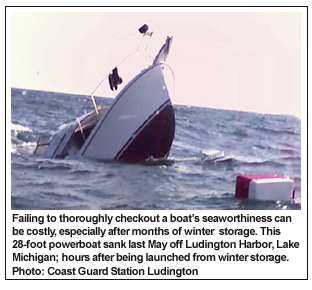|
Casting Out the Winter Gremlins
by Tom Rau
 “No matter how squared you prepare
your boat for winter storage
the Winter Gremlins still sneak
aboard,” said Dave Gramza, long-time
Manistee charter boat captain.
“No matter how squared you prepare
your boat for winter storage
the Winter Gremlins still sneak
aboard,” said Dave Gramza, long-time
Manistee charter boat captain.
Dave expressed his Gremlin concerns
moments after I watched him skillfully
back his 29-foot powerboat into the
slip along the Manistee River Channel.
On the dock, my Australian cattle dog
Aussie cautiously approached Dave.
Aussie shares a common characteristic
possessed by all smart boat owners—
caution. Aussie’s tail began wagging
while sniffing Dave’s pants rich
with the scent of his dog Skipper.
Dave had recently placed his boat
into the water after a brutal winter and as
with Aussie, he was sniffing things out
to determine if his boat was Gremlinfree.
“Things like boat navigation lights
that worked fine when you stowed the
boat may not work in spring,” said
Dave. But of greater concern to Dave are
issues below deck like cold water intake
lines that cool the engine and the clamps
that secure them to connecting joints. Of
equal concern are packing glands around
the engine shafts that prevent the intake
of water through a rotating shaft.
The packing glands allow a slight
intake of water to cool and lubricate the
glands; however, winter Gremlins can
cause the glands to open up or hose
clamps to loosen.
“When a boat sits in the water, its
load is evenly distributed throughout the
hull; however, when it sits on a winter
cradle, the support beams absorb more
of the load than points in between,” said
Captain Steve Hamilton, who occupies a
boat slip next to Dave’s boat.
Slight as the imbalance might be,
the stress can influence hose clamps
around water intake lines and packing
glands. These subtle influences can spell
disaster if not corrected. Such could well
have been the case involving a 28-foot
powerboat that sank off Ludington
Harbor last May.
The owner had placed the boat in
the water at Manitowoc, Wisconsin,
after winter storage. Although he had
checked out the engine space before
departing across Lake Michigan, he
failed to check it again while transiting
the lake. Eight miles off Ludington, he
lost his starboard engine and moments
later his port engine. He fired off a
Mayday over Channel 16, the
International distress frequency.
A Coast Guard rescue boat out of
Ludington responded and pulled the five
people off the boat moments before it
went down in 350 feet of water. How
water found its way into the boat
remains a mystery; however, one thing
is for certain: had the captain checked
for winter Gremlins like Dave Gramza
does in the safe confines of a harbor, the
doomed captain may have spotted the
leak in ample time to take corrective
action.
Mice and other rodents like rats can
gnaw their way aboard to escape winter,
while feeding on protein admix boat
components like electrical wiring. It all
can take its toll, mostly on the unenlightened.
Of the thousands of rescues the
Coast Guard conducted across the Great
Lakes in 2008, forty-three percent
involved disabled boats, many due to
mechanical failures. Most of these
breakdowns can be avoided through
proper maintenance and boat checks
before getting underway. And you never
know what you might find.
“See that boat over there,” said
Dave, pointing to a 28-foot charter boat
in a nearby slip. “The captain soon after
getting underway with customers discovered
a raccoon in the forward cabin.
He’s lucky; it could have been a provoked
skunk.”
Boat Smart, don’t be skunked.
Make sure your boat is Gremlin-free
before getting underway. A sure way is
to request a free vessel safety check
from the Coast Guard Auxiliary or
United States Power Squadron. Search
Google for exams available in your area.
Tom Rau is a retired 27-year Coast
Guard veteran, boating safety columnist,
and author of Boat Smart Chronicles,
Lake Michigan Devours Its Wounded.
His book is a 20-year journal of recreational
boating mishaps with valuable
lessons learned. It, along with recent
rescue stories, can be viewed at:
www.boatsmart.net
TOP
|